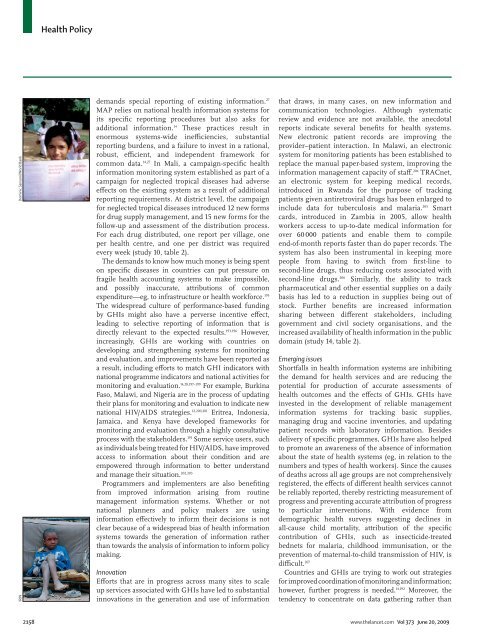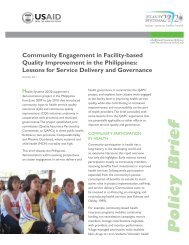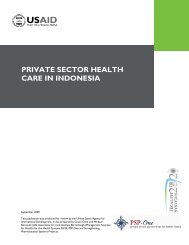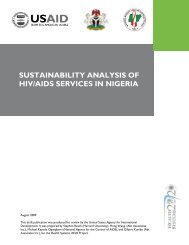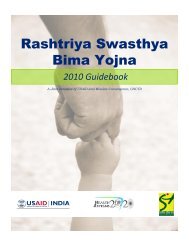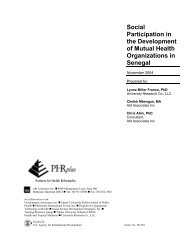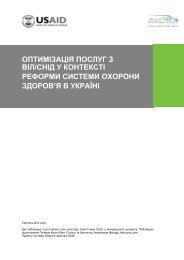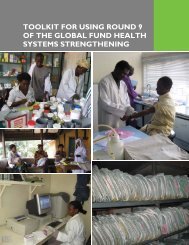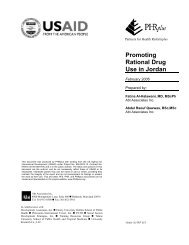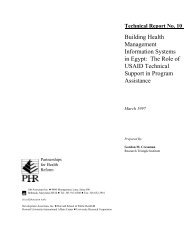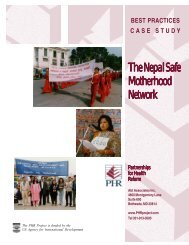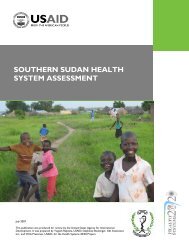An assessment of interactions between global ... - ResearchGate
An assessment of interactions between global ... - ResearchGate
An assessment of interactions between global ... - ResearchGate
Create successful ePaper yourself
Turn your PDF publications into a flip-book with our unique Google optimized e-Paper software.
Health Policy<br />
IRIN Dominic Sansoni/World Bank<br />
demands special reporting <strong>of</strong> existing information. 27<br />
MAP relies on national health information systems for<br />
its specific reporting procedures but also asks for<br />
additional information. 14 These prac tices result in<br />
enormous systems-wide inefficiencies, substantial<br />
reporting burdens, and a failure to invest in a rational,<br />
robust, efficient, and independent framework for<br />
common data. 14,27 In Mali, a campaign-specific health<br />
information monitoring system established as part <strong>of</strong> a<br />
campaign for neglected tropical diseases had adverse<br />
effects on the existing system as a result <strong>of</strong> additional<br />
reporting requirements. At district level, the campaign<br />
for neglected tropical diseases introduced 12 new forms<br />
for drug supply management, and 15 new forms for the<br />
follow-up and <strong>assessment</strong> <strong>of</strong> the distribution process.<br />
For each drug distributed, one report per village, one<br />
per health centre, and one per district was required<br />
every week (study 10, table 2).<br />
The demands to know how much money is being spent<br />
on specific diseases in countries can put pressure on<br />
fragile health accounting systems to make impossible,<br />
and possibly inaccurate, attributions <strong>of</strong> common<br />
expenditure—eg, to infrastructure or health workforce. 195<br />
The widespread culture <strong>of</strong> performance-based funding<br />
by GHIs might also have a perverse incentive effect,<br />
leading to selective reporting <strong>of</strong> information that is<br />
directly relevant to the expected results. 193,196 However,<br />
increasingly, GHIs are working with countries on<br />
developing and strengthening systems for monitoring<br />
and evaluation, and improvements have been reported as<br />
a result, including efforts to match GHI indicators with<br />
national programme indicators and national activities for<br />
monitoring and evaluation. 14,28,197–199 For example, Burkina<br />
Faso, Malawi, and Nigeria are in the process <strong>of</strong> updating<br />
their plans for monitoring and evaluation to indicate new<br />
national HIV/AIDS strategies. 12,200,201 Eritrea, Indonesia,<br />
Jamaica, and Kenya have developed frameworks for<br />
monitoring and evaluation through a highly consultative<br />
process with the stakeholders. 191 Some service users, such<br />
as individuals being treated for HIV/AIDS, have improved<br />
access to information about their condition and are<br />
empowered through information to better understand<br />
and manage their situation. 202,203<br />
Programmers and implementers are also benefiting<br />
from improved information arising from routine<br />
management information systems. Whether or not<br />
national planners and policy makers are using<br />
information effectively to inform their decisions is not<br />
clear because <strong>of</strong> a widespread bias <strong>of</strong> health information<br />
systems towards the generation <strong>of</strong> information rather<br />
than towards the analysis <strong>of</strong> information to inform policy<br />
making.<br />
Innovation<br />
Efforts that are in progress across many sites to scale<br />
up services associated with GHIs have led to substantial<br />
innovations in the generation and use <strong>of</strong> information<br />
that draws, in many cases, on new information and<br />
communication technologies. Although systematic<br />
review and evidence are not available, the anecdotal<br />
reports indicate several benefits for health systems.<br />
New electronic patient records are improving the<br />
provider–patient interaction. In Malawi, an electronic<br />
system for monitoring patients has been established to<br />
replace the manual paper-based system, improving the<br />
information management capacity <strong>of</strong> staff. 204 TRACnet,<br />
an electronic system for keeping medical records,<br />
introduced in Rwanda for the purpose <strong>of</strong> tracking<br />
patients given antiretroviral drugs has been enlarged to<br />
include data for tuberculosis and malaria. 205 Smart<br />
cards, introduced in Zambia in 2005, allow health<br />
workers access to up-to-date medical information for<br />
over 60 000 patients and enable them to compile<br />
end-<strong>of</strong>-month reports faster than do paper records. The<br />
system has also been instrumental in keeping more<br />
people from having to switch from first-line to<br />
second-line drugs, thus reducing costs associated with<br />
second-line drugs. 206 Similarly, the ability to track<br />
pharmaceutical and other essential supplies on a daily<br />
basis has led to a reduction in supplies being out <strong>of</strong><br />
stock. Further benefits are increased information<br />
sharing <strong>between</strong> different stakeholders, including<br />
government and civil society organisations, and the<br />
increased availability <strong>of</strong> health information in the public<br />
domain (study 14, table 2).<br />
Emerging issues<br />
Shortfalls in health information systems are inhibiting<br />
the demand for health services and are reducing the<br />
potential for production <strong>of</strong> accurate <strong>assessment</strong>s <strong>of</strong><br />
health outcomes and the effects <strong>of</strong> GHIs. GHIs have<br />
invested in the development <strong>of</strong> reliable management<br />
information systems for tracking basic supplies,<br />
managing drug and vaccine inventories, and updating<br />
patient records with laboratory information. Besides<br />
delivery <strong>of</strong> specific programmes, GHIs have also helped<br />
to promote an awareness <strong>of</strong> the absence <strong>of</strong> information<br />
about the state <strong>of</strong> health systems (eg, in relation to the<br />
numbers and types <strong>of</strong> health workers). Since the causes<br />
<strong>of</strong> deaths across all age groups are not comprehensively<br />
registered, the effects <strong>of</strong> different health services cannot<br />
be reliably reported, thereby restricting measurement <strong>of</strong><br />
progress and preventing accurate attribution <strong>of</strong> progress<br />
to particular interventions. With evidence from<br />
demographic health surveys suggesting declines in<br />
all-cause child mortality, attribution <strong>of</strong> the specific<br />
contribution <strong>of</strong> GHIs, such as insecticide-treated<br />
bednets for malaria, childhood immunisation, or the<br />
prevention <strong>of</strong> maternal-to-child transmission <strong>of</strong> HIV, is<br />
difficult. 207<br />
Countries and GHIs are trying to work out strategies<br />
for improved coordination <strong>of</strong> monitoring and information;<br />
however, further progress is needed. 14,192 Moreover, the<br />
tendency to concentrate on data gathering rather than<br />
2158 www.thelancet.com Vol 373 June 20, 2009


